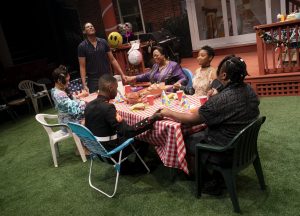
The screen projects a moody and relentless drive along a very long road. That might represent imagery for this particular story. For me it unhelpfully underscored how long and boring Who Killed My Father was to endure.
Édouard Louis adapted this memoir and is the performer in this solo show. The material covers the same territory as his History of Violence, also based on a memoir and directed by Thomas Ostermeier. Both vehicles cover his homosexuality and the negativity he experiences. This one, however, focuses on his father. At fifty years old, Dad suffered severe health issues which are described as a result of life choices. The play interestingly attempts to recast the blame on his behavior toward his son to a much broader canvas – society as a whole.
Like the previous work, this one vacillates between deeply morose and lip synching “Barbie Girl” as a young teen to the horror of his parents. The father is represented as an empty chair on stage. Perhaps this memoir and subsequent adaptation is therapeutic for Mr. Louis. I felt I was sitting through someone’s therapy without being compensated to do so. Ah, the opposite. I paid to be there.
schaubühne Berlin and Théâtre de la Ville Paris are presenting this show at St. Ann’s Warehouse. In addition to the excellent History of Violence, schaubühne helped us theater lovers during Covid by streaming some recordings of previous shows. I saw both Bella Figura and Professor Bernhardi during that time. The high quality of these productions caused me to see this troupe live once again. This one is a huge miss for me.
There is a hint within Who Killed My Father that suggests that the elder man may have been gay or at least confused. That morsel gets a moment and includes a picture of Dad dressed as a Majorette. The moment quickly flies past as society takes the brunt of this man’s ire. The analysis of this personal journey might be intellectually captivating. As a piece of theater, however, the tale drones on despite a short ninety minute running time.
Who Killed My Father is running at St. Ann’s Warehouse through June 5, 2022.
theaterreviewsfrommyseat/historyofviolence










You must be logged in to post a comment.